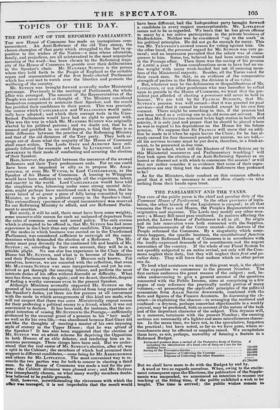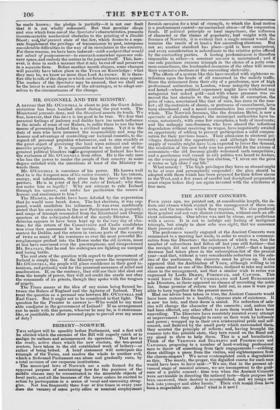• THE PARLIAMENT AND THE TAXES. : sure ;'a Money
Bill must pass unaltered. In matters affecting the econcerns the Ways and Means, the People's RepresentatiVes are pocket, the Lower House of Parliament is all in all. Its origin Tim care of the public purse is the chief and peculiar duty of the lation, the other branch of the Legislature is coequal; in all that originative and supreme. The Lords may modify any other mea- Commons House of Parliament. In the other provinces of legis- and its late renovation were both connected with the Supplies. The embarrassments of the Crown created—tile distress of the People reformed the Commons. By a singularity which some- times happens, the specific business, the constitutional function of the first Reformed House of Commons is in accordance with the loudly-expressed demands of its constituents and the urgent necessities of the country. If the whole of our Fiscal System be not speedily subjected to an entire revisal, not only will the Com- mons neglect their duty, but they will neglect their first and pc- - culler duty. They will leave that undone which no other power can do.
To lend what assistance we may in this great work, is the object of the exposition we commence in the present Number. The first section embraces the great masses of the subject ; and; be- sides endeavouring to give a general account of the questions connected with the Public Income, aims at comprising in a feW pages of easy reference the practically useful portion of many volumes,—at presenting the applicable principles of the political economists from ADAM SMITH downwards, combined with the facts and figures of the Finance Accounts. In discussing the ab- stract—in explaining the obscurein arranging the scattered and confused—a dryness, perhaps somewhat objectionable in a weekly journal, may be pardoned, both on account of the nature of the task and of the important character of the subject. This dryness will, in a measure, terminate with the present Number; the ensuing sections are necessarily of a lighter and more miscellaneous charac- ter. In the mean time, we have not, in the speculative, forgotten the practical ; but have noted, so far as we have gone, where re- trenchments may be effected or supplies raised. We recapitulate them here, as not, perhaps, unworthy of forming a feature in a Reformed Budget. Estimated.produce from a revisal of the Protective Scale of Duties, £ including the substitution of a fixed late of duty on Corn for the shifting scale 750000 Saving in the Preventive Seivice 500.000 Expense of Collecting the Customs 250,000 250,000 Expense of Collecting the other Branches £1,750.000 But we shall have more to do with the Budget by and by. A word or two as regards ourselves. When, owing to the excite- ment consequent upon theElections, the publication of the Supple- ments was suspended, we announced an intention to resume our teaching at the fitting' time, if the public exhibited a wish to be taught., The time is arrived.; the public .wishes remain. to he made known; the pledge is partially—it is not our fault that it is not wholly redeemed.- But that peculiar shape and size which form one of the Spectator's characteristics, presents insurmountable mechanical obstacles to the printing of a Double Sheet; andythe!present state of the; law, which denies to a sepa- rate Supplement the privilege of transmission by post, interposes considerable difficulties in the way of its circulation in the country. For these reasons, we have been induced—with a subject that would not admit of postponement—to encroach somewhat upon our ordi- nary space, and embody the matter in the journal itself. This, how- ever, is done in such a manner that it may be cut off and preserved in a separate form. Before another month elapses, some changes will possibly have taken place in the Taxes on Knowledge: what they may be, we know no more than Lord ALTHORP. It is there- fore idle to talk of the shape in which our future labours may appear. The readers of the Spectator may be assured, that we shall not be the latest to avail ourselves of the advantages, or to adapt our- selves to the circumstances of the change.













 Previous page
Previous page